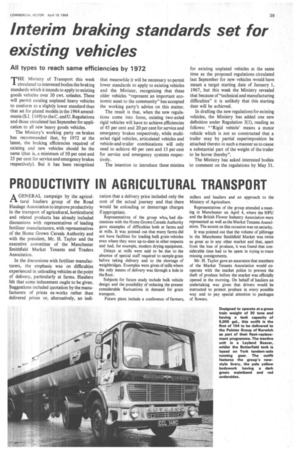PRODUCTIVITY IN AGRICULTURAL TRANSPORT
Page 41

If you've noticed an error in this article please click here to report it so we can fix it.
AGENERAL campaign by the agricultural hauliers group of the Road Haulage Association to improve productivity in the transport of agricultural, horticultural and related products has already included discussions with representatives of leading fertilizer manufacturers, with representatives of the Home Grown Cereals Authority and with the president, Mr. H. Taylor and the executive committee of the Manchester Smithfield Market Tenants and Traders Association.
In the discussions with fertilizer manufacturers, the emphasis was on difficulties experienced in unloading vehicles at the point of delivery, particularly at farms. Hauliers felt that some inducement ought to be given. Suggestions included quotation by the manufacturers of prices ex-works rather than delivered prices or, alternatively, an indi
cation that a delivery price included only the cost of the actual journey and that there would be unloading or demurrage charges if appropriate.
Representatives of the group who had discussions with the Home Grown Cereals Authority gave examples of difficulties both at farms and at mills. It was pointed out that many farms did not have facilities for loading bulk grain vehicles even where they were up-to-date in other respects and had, for example, modern drying equipment.
Delays at mills were said to be due to the absence of special staff required to sample grain before taking delivery and to the shortage of weighbridges. Examples were given of mills where the only means of delivery was through a hole in the floor.
Subjects for future study include bulk vehicle design and the possibility of reducing the present considerable fluctuations in demand for grain transport.
Future plans include a conference of farmers, millers and hauliers and an approach to the Ministry of Agriculture.
Representatives of the group attended a meeting in Manchester on April 4, where the NFU and the British Flower Industry Association were represented as well as the Market Tenants Association. The accent on this occasion was on security.
It was pointed out that the volume of pilferage in the Manchester Smithfield Market was twice as great as in any other market and that, apart from the loss of produce, it was found that considerable time had to be spent in trying to trace missing consignments.
Mr. H. Taylor gave an assurance that members of the Market Tenants Association would cooperate with the market police to prevent the theft of produce before the market was officially opened in the morning. On behalf of hauliers an undertaking was given that drivers would be instructed to protect produce in every possible way and to pay special attention to packages of flowers.








































































































































